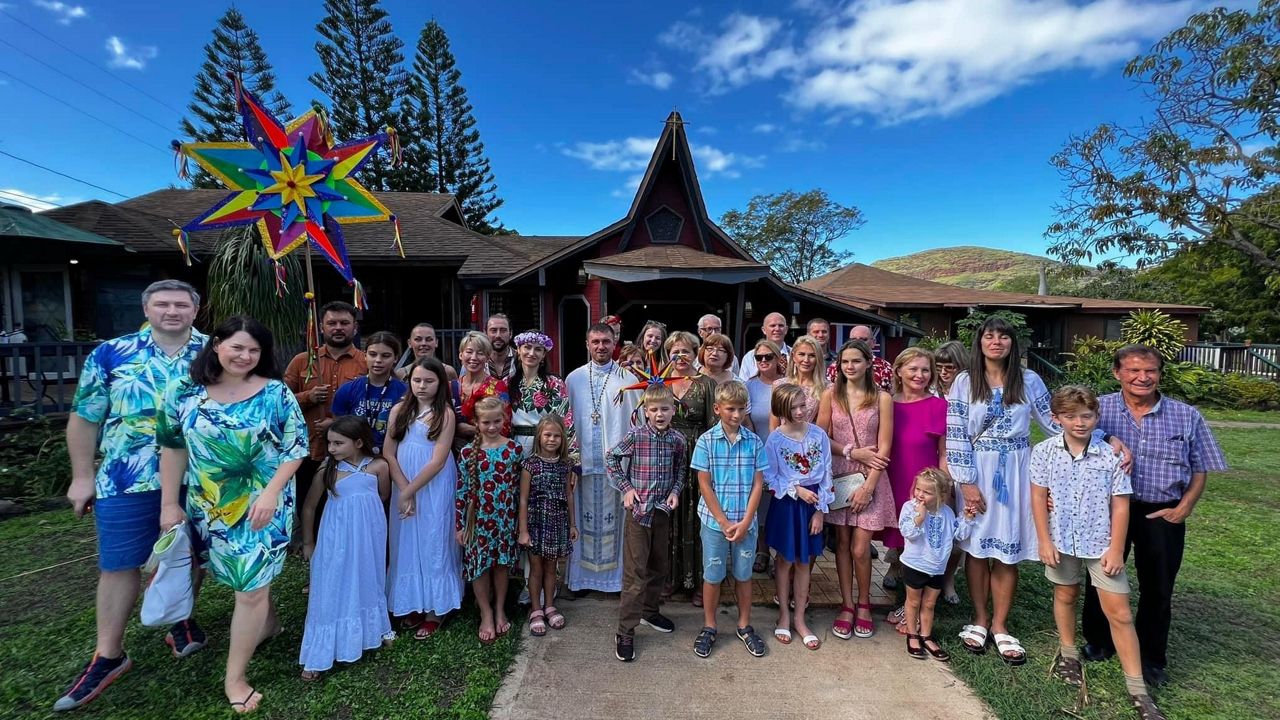Editor’s Note: This story includes a discussion of suicide. The 988 Suicide and Crisis Lifeline is a hotline for individuals in crisis or those looking to help someone else. To speak with a trained listener, call 988. Visit 988lifeline.org for crisis chat services or more information.
Russia invaded Ukraine a year ago on Feb. 24. For the first anniversary of the war, Spectrum News Hawaii spoke to five Ukrainians who live in Hawaii to find out what it has been like for them to see their home country attacked.
Yuliya LaBrosse, who has lived on Maui for 18 years, became so deeply depressed hearing about all the lives lost in the war that she said she also wanted to die. Olga Sousa, who works in Hawaii as a background actor in shows like “Magnum P.I.,” sends money every month to volunteer groups in Ukraine who feed orphaned children. Mariia Babinska fled Ukraine with her two young children, starting a completely new life on Oahu. Elena Roud, a real estate agent who moved to Honolulu 30 years ago, helped her elderly parents relocate from Ukraine to Hawaii. Oksana Enriquez Klyuchnichenko, who moved to Oahu when she was 15, went to Ukraine for three months to volunteer with a humanitarian organization and now has post-traumatic stress disorder.
Here are their stories.
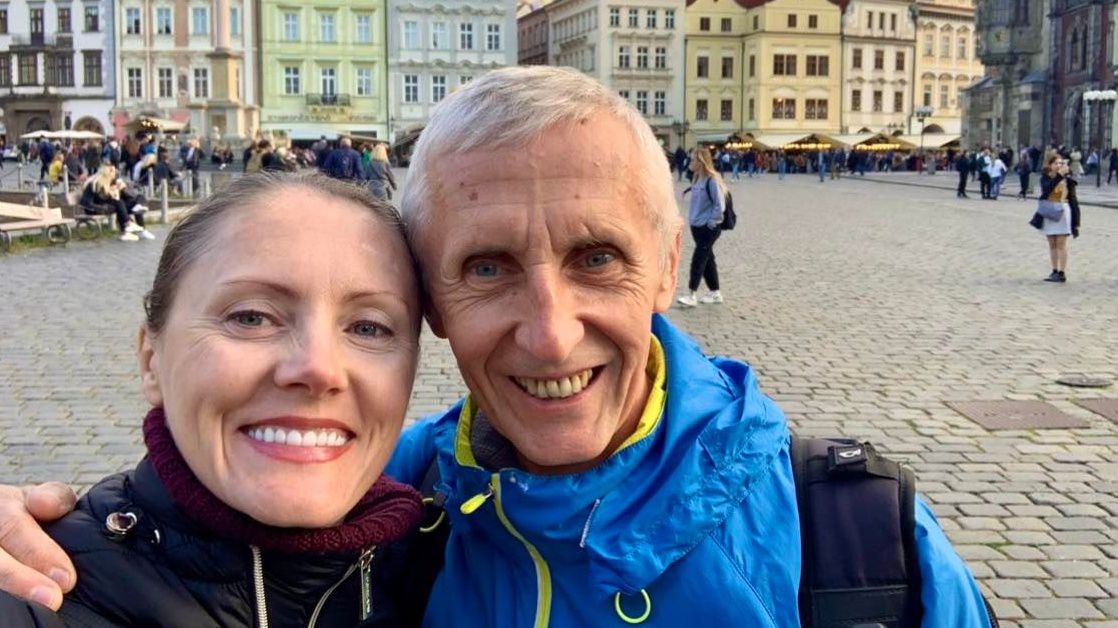
Yuliya LaBrosse
Yuliya LaBrosse, who grew up in Luhansk, Ukraine, stopped following the news of the war a few months after it started because she became deeply depressed.
“I lost hope in humanity. They were killing children and women,” said LaBrosse about the Russian military. “Nobody could stop it, and I just felt like I don't want to be in this world anymore.”
The Maui resident said she sought help for her depression and eventually got a ketamine injection. For decades, doctors used ketamine as an anesthetic, but in more recent years, it has been administered as a treatment for severe depression and suicidal ideation.
“You kind of die on ketamine and come back and then you don't want to die anymore,” said LaBrosse. She said the experience made her realize that if she died, she wouldn’t be able to help her friends who are still in Ukraine.
When LaBrosse spoke to Spectrum News Hawaii last year at the start of the war, her father was fleeing Ukraine on a train. After making it to the Polish border, he was able to leave the country and move to the Czech Republic.
In October, LaBrosse visited her father in Prague and discovered he was just one of many Ukrainians who had relocated to the city. LaBrosse could easily spot fellow Ukrainians because they wore yellow and blue. While there, she wore yellow and blue ribbons in her hair, “so we can see each other,” she said.
“There’s so many of them and when they start talking, it’s heartbreaking. They cry. They lose their home. They (are) homesick, but home doesn’t exist anymore,” said LaBrosse. “It was really painful to see that, but at least they are safe.”
Olga Sousa
Olga Sousa, who grew up in Zaporizhzhia in southeastern Ukraine and immigrated to the U.S. when she was 19, regularly checks on her grandparents and friends in Ukraine, who tell her that living in a war-torn country has become “normal.”
“They don’t think it’s going to end anytime soon, so they have adjusted to the life they live there,” said Sousa.
Russian military attacks on Ukraine’s energy infrastructure have caused millions of households to go without electricity for parts of the day, as the country has rolling blackouts.
“A lot of parts of the country, it's four hours (of) no electricity, and 30 minutes of electricity, so they actually plan their days around that,” said Sousa.
After the war started, Sousa’s grandparents moved from Kharkiv to Poltava, which is in central Ukraine. However, it’s still dangerous. The building next to the one they live in was destroyed.
“They go to sleep just praying that they wake up in the morning alive,” said Sousa. “This is just normal for them now. They just go to sleep, hoping that nothing’s going (to) happen overnight.”
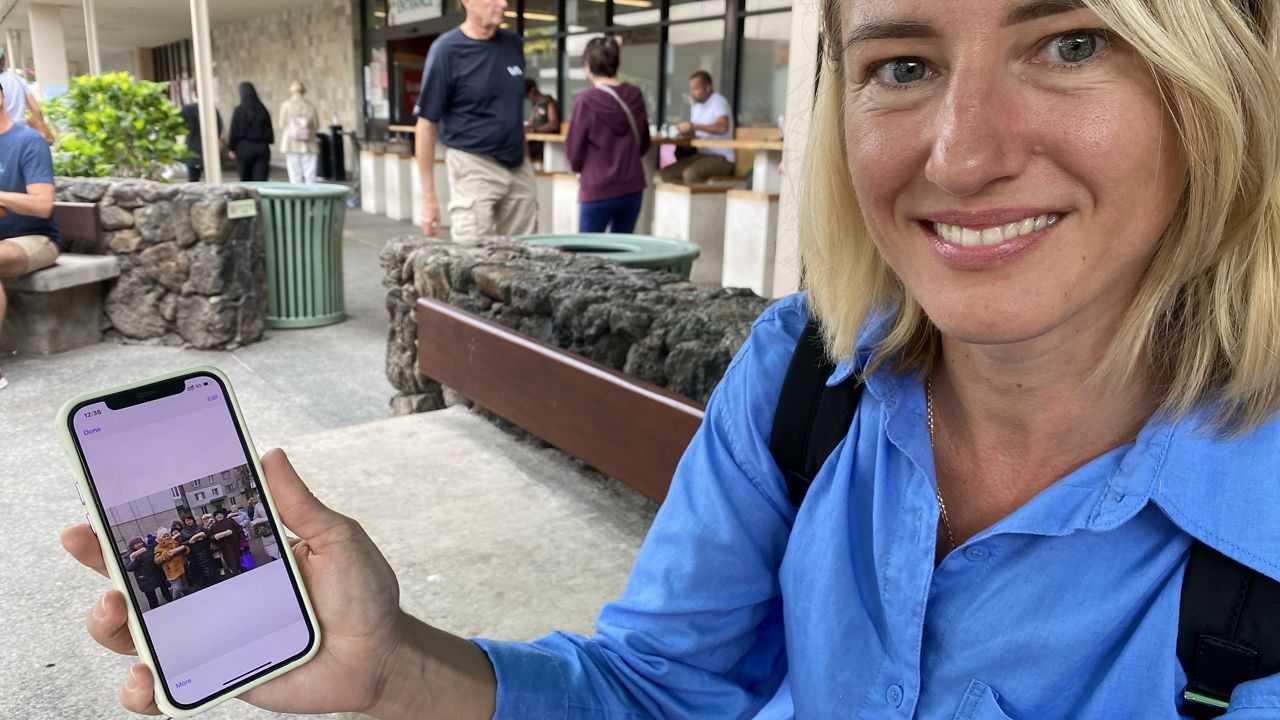
Mariia Babinska
Babinska, a 35-year-old mother of two from Kyiv, said when the war started, she moved to Ivano-Frankivsk in West Ukraine because it was safer than her hometown. Still, every night, she would hear warning sirens and bomb attacks.
In April 2022, a family in Kaneohe sponsored Babinska and her children, allowing them to move to Hawaii through the United States’s Uniting for Ukraine program. However, her husband could not leave Ukraine because shortly after the war started, the Ukrainian government banned most men between 18 and 60 from leaving, as they might be called to fight.
Moving has been a huge adjustment for Babinska, she said, because English is her third language after Ukrainian and Russian. She has had to live in the homes of kind strangers because none of her lifelong friends live in Hawaii. Further complicating matters, she must take care of her kids without the help of her husband while also looking for a job. Over time, Babinska connected with the Ukrainian community on Oahu, which has eased the transition.
Still, her future remains uncertain, as she doesn’t know if her husband will be able to join her in Hawaii, and the Uniting for Ukraine program only allows her to stay in the U.S. for two years — even though it is unknown when the war will end.
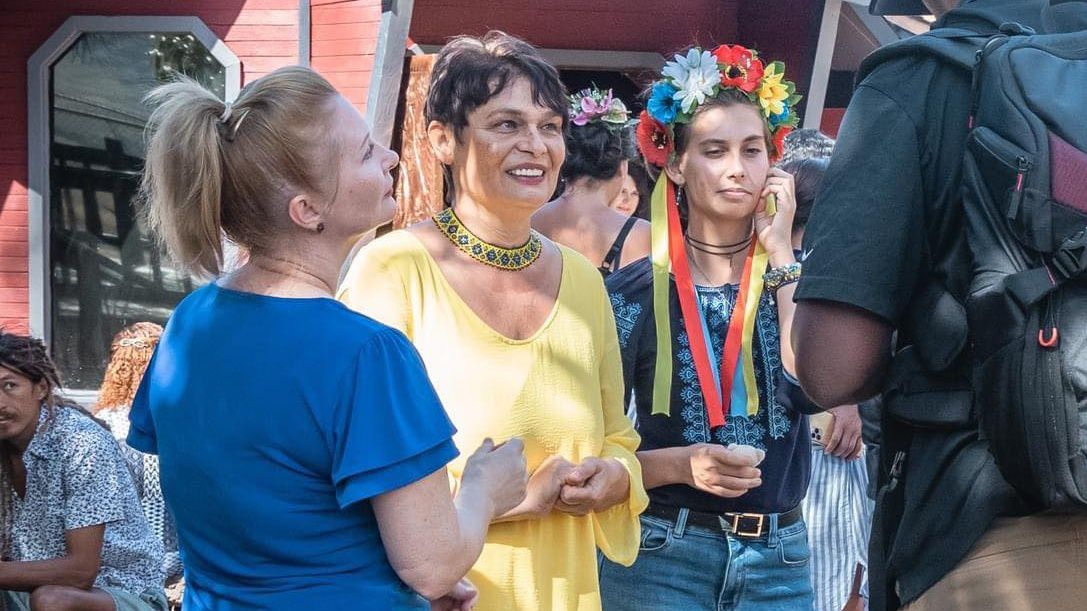
Elena Roud
Elena Roud, a 54-year-old real estate agent who moved to Hawaii when she was 25, said she helped her parents and her husband’s mom, who are in their 70s and 80s, leave Ukraine and come to Hawaii through the Uniting for Ukraine program. Although they are safe now, Roud’s parents and her mother-in-law long to return to Ukraine, where the rest of their family, their friends, and the places they frequented still are.
“All day long, they talk about how much they want to go back,” said Roud.
Last year when Spectrum News Hawaii spoke to Roud, she was organizing weekly rallies to support Ukraine from Honolulu. In August, she said the rallies became less frequent, as many Ukrainians in Hawaii were emotionally drained. For the one-year anniversary of the war, Ukrainian organizers are holding a rally on Feb. 24 at 4 p.m. at the Hawaii State Capitol and will observe a moment of silence for all the people who have died.
Hawaii doesn’t have a Ukrainian cultural center like in other parts of the U.S., so the rallies helped the Ukrainian community in Hawaii gather and connect, according to Roud. Now Ukrainians in Hawaii are coming up with new ways to connect. One gathering place is the St. Sophia Ukrainian Greek Catholic Church in Waianae, which was reopened in Nov. 2022. (The Ukrainian Catholic community held services there from 1992 until the mid-2000s, when services were moved to Waikiki. Services stopped altogether in 2011.)
Along with community, Ukrainians who moved to Hawaii need assistance. Roud highlighted that the Pacific Gateway Center, a nonprofit that helps immigrants transition to life in Hawaii, has worked with 135 Ukrainians who have relocated to Hawaii, including her friend Mariia Babinska.
Terrina Wong, the Director of Social and Immigration Services at PGC, said people hoping to help Ukrainians immigrants can donate or volunteer to pick up neighbor island Ukrainians at the airport who need to go to the U.S. Citizenship and Immigration Services Honolulu District Office. The nonprofit also needs housing and job referrals to support Ukrainians in Hawaii.
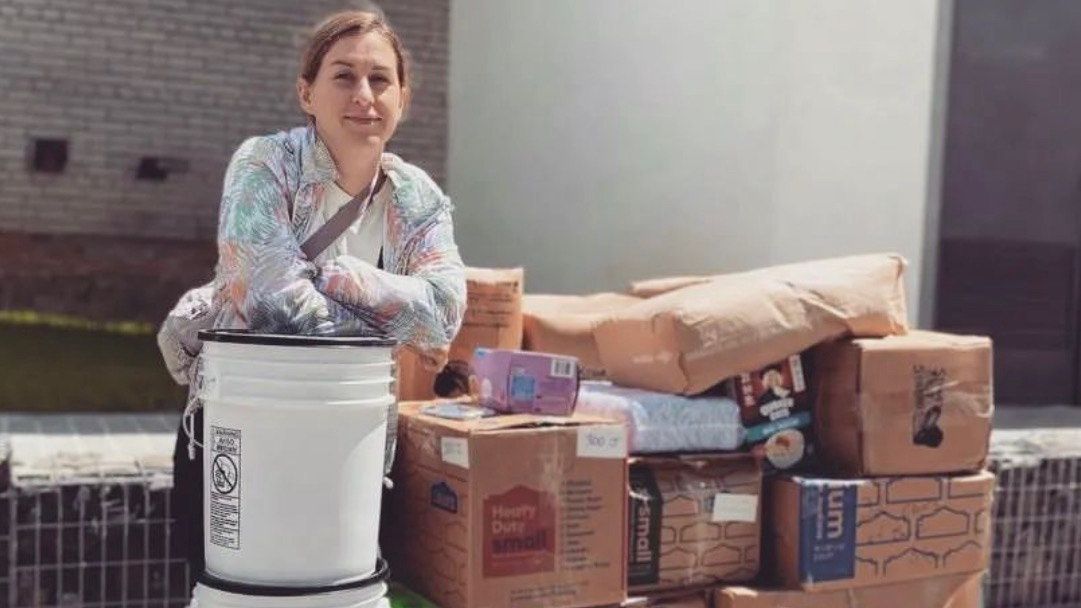
Oksana Enriquez Klyuchnichenko
Oksana Enriquez Klyuchnichenko, a 34-year-old from Donbas, Ukraine, has lived in Hawaii for almost 20 years. When the war started, Klyuchnichenko wanted to help, so she started working from Hawaii with a volunteer organization, Svitlyachky Blago (Fireflies For Hope), which is based in her hometown, Kostiantynivka.
At first, pharmacies in Ukraine were shut down and there was no way to access life-saving medications, so the organization helped bring in drugs for patients with thyroid cancer, heart disease and epilepsy. In order to fundraise, Klyuchnichenko reached out to her friends on Facebook and spoke with multiple Rotary Clubs in Hawaii.
In June, Klyuchnichenko went to Lviv in Ukraine to work with Svitlyachky Blago, picking up medications at the border of Ukraine that were bought in Hungary. She also helped her parents evacuate from her embattled hometown to Dnipro, Ukraine, where they now live with friends she made through Svitlyachky Blago. She stayed in Ukraine for three months.
“I didn't go to my hometown because it's too dangerous. But I've been in places where… the building would shake from explosions,” said Klyuchnichenko.
When she returned to Hawaii, she had PTSD from the experience.
“It was tough for me when I came back to Hawaii to hear fireworks,” said Klyuchnichenko. “I would shake.”
Despite this, Klyuchnichenko plans to return to Ukraine to continue to help.
“There’s more people that need our help,” said Klyuchnichenko. “You can’t be a silent bystander in life.”
Now, Klyuchnichenko is working with Svitlyachky Blago to buy food for Ukrainians in need. Anyone who wishes to contribute can donate here.
Michelle Broder Van Dyke covers the Hawaiian Islands for Spectrum News Hawaii. Email her at michelle.brodervandyke@charter.com.



